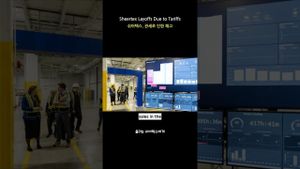The Toronto Raptors have made headlines once again with the acquisition of veteran forward PJ Tucker, trading away guard Davion Mitchell as part of their strategy to build for the future.
This trade, confirmed by ESPN's Shams Charania, is set against the backdrop of the fast-approaching NBA trade deadline, with significant dynamics at play. The Raptors received Tucker, along with the Los Angeles Lakers' 2026 second-round pick and cash, signaling their commitment to reshaping the roster.
Tucker's return to the Raptors is noteworthy as he was originally drafted by the team back in 2006. He played briefly during the 2006-07 and again during the 2016-17 season, where his versatility and defensive skills earned him recognition around the league. The decision to bring him back, albeit likely for just the remainder of the trade period before buying out his contract, highlights the Raptors’ tactical maneuvers to acquire assets without committing to long-term contracts.
Davion Mitchell, the guard being sent to Miami, came to the Raptors from the Sacramento Kings just the previous summer. The 24-year-old's tenure with the team saw him averaging 6.3 points, 1.9 rebounds, and 4.6 assists per game, but with his role diminishing as Jamal Shead emerged, he became surplus to requirements. Mitchell's strong defensive game was valued, especially during key moments of the season, making him a solid addition for the Miami Heat.
This trade not only frees up some cap space for the Raptors but also gives them another piece for their rebuilding process. According to TSN’s Josh Lewenberg, this move allows the Raptors to stockpile another draft pick, which is key for teams focused on developing younger talent and rebuilding strategies.
"This move is still a wise one from Masai Ujiri and his staff, as it gives this rebuilding group another draft pick in exchange for Mitchell, who was no longer part of the long-term plans," Lewenberg said, underlining the rationale behind the trade.
The Raptors took additional steps just hours before making this trade by acquiring former All-Star Brandon Ingram from the New Orleans Pelicans, showing their eagerness to create a competitive environment moving forward. With these trades, the Raptors are clearly attempting to transition from a rebuilding phase to building around core players who can contribute immediately.
On the other side, Miami's acquisition of Mitchell is viewed as advantageous for their playoff aspirations. The Heat are banking on his defensive acumen to shore up their perimeter play. His contract, worth $6.5 million and expiring at the season's end, provides Miami with some flexibility as they reconfigure their roster for championship contention.
Tucker's anticipated buyout is also noteworthy, as teams across the league will be eyeing him as a low-cost addition to bolster their rosters for the playoff push. Although thoughts of Tucker returning to Toronto had fans reminiscing, it is likely his stay will be short-lived, as discussions around his release or buyout are circulating widely.
The excitement surrounding this trade and others marks just the kind of frenetic activity typical of the NBA as teams assess their rosters and positions just before the trading deadline. The decisions made now will reverberate through the rest of the season, impacting playoffs contention across the league.
While Tucker’s career has seen him play for multiple teams, including stints with the Philadelphia 76ers and Utah Jazz before this trade, his history with the Raptors adds another layer to the current narrative. His playoff experience and veteran presence are valued assets, should he end up on another competing roster after the buyout.
Mitchell, now with the Heat, will aim to carve out his niche, hoping to get more playing time and opportunities to showcase his talent on the playoff stage. For both players, the next chapters will define their careers going forward, linking back to the significant actions of their franchises.
This whirlwind of trades and acquisitions emphasizes the high stakes of the NBA trade deadline as teams like the Raptors and Heat navigate the complex waters of roster management, ensuring their squads are primed for the challenges of the season and beyond.



